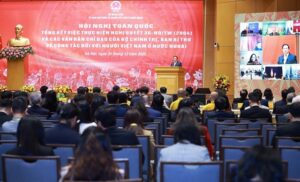Second National Press Forum in Hanoi Highlights Strategic Vision for Vietnamese Journalism in the Digital Age

Hanoi, The Gulf Observer: The second National Press Forum concluded successfully in Hanoi on June 20, offering a dynamic platform for dialogue, innovation, and strategic orientation for the future of Vietnamese revolutionary journalism, Chairman of the Vietnam Journalists’ Association Lê Quốc Minh affirmed in his closing remarks.
Lê Quốc Minh, who also heads the Steering Committee for the National Press Festival 2025, emphasized that the two-day forum stood out as a prominent highlight among activities marking the 100th anniversary of Vietnam Revolutionary Press Day. The event garnered widespread attention from the press community and the general public.
Commending the contributions of nearly 70 expert speakers and hundreds of active participants—including journalists, media leaders, press managers, students, and communication professionals—Minh noted that the forum hosted 12 high-quality sessions, including 10 thematic panel discussions. These panels addressed critical and timely topics, reflecting the evolving demands of the media landscape.
In a rapidly changing global environment shaped by digital technology, artificial intelligence (AI), and globalization, Minh underscored that Vietnamese journalism faces unprecedented challenges—but also significant opportunities. He pointed to the growing dominance of social media video content and user-generated information as major disruptors to traditional media, posing a direct challenge to the credibility and influence of mainstream news outlets.
“This new era demands that journalism not only adapt but lead,” Minh said. “While AI may be capable of producing vast quantities of content, journalism’s sustainable path lies in delivering high-quality, reliable information anchored in core values. Journalism must redefine its mission—not to be the fastest, but to provide the most meaningful and trustworthy content.”
The forum served as a vital intellectual and professional space for journalists nationwide, facilitating in-depth discussions on transforming Vietnam’s media sector into a modern, professional, and human-centered pillar of the country’s development.
The opening session, titled “Vietnamese Journalism in the New Era: Vision for Creating Development Space,” brought together experts and delegates to explore strategies for the sustainable advancement of the press sector, analyzing both opportunities and challenges.
A dedicated session on AI and Digital Transformation Strategies drew strong participation from media executives, journalists, and technology experts, who agreed that artificial intelligence presents vast opportunities to enhance content quality, increase public engagement, and help newsrooms stay relevant in the digital age.
In the “Revenue in the Digital Age” session, speakers highlighted the critical need for newsrooms to secure diversified and sustainable funding models alongside producing quality journalism, recognizing the dual imperative of content excellence and financial viability.
Other topical sessions addressed female leadership in journalism, strategies for engaging Generation Z, television’s evolution in a new media landscape, and mechanisms for developing radio broadcasting in the current era.
One of the most closely watched sessions was the 10th panel, which focused on Resolution 18 and the Need for Innovation in Press Personnel. The resolution—part of broader efforts to streamline Vietnam’s political and administrative systems—calls for restructuring the media sector to improve efficiency and effectiveness. Participants stressed that reform must go beyond structural consolidation to include optimising resources, minimizing waste, and modernising operations through converged newsrooms and updated workflows.
With the successful conclusion of the second National Press Forum, stakeholders reaffirmed their shared commitment to building a resilient, innovative, and ethically grounded Vietnamese press—capable of upholding its pivotal role in national development and public service in an era defined by digital transformation.


